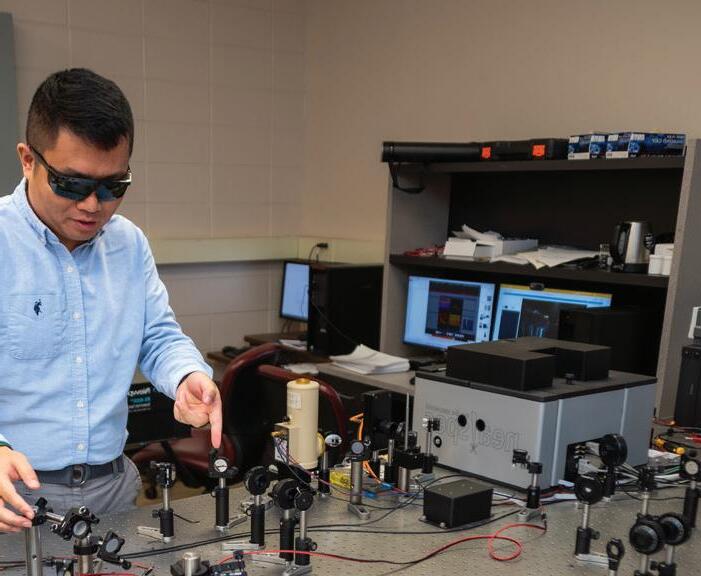




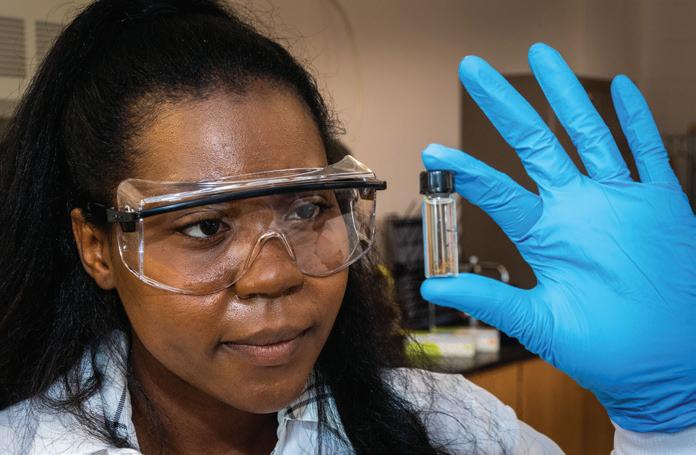


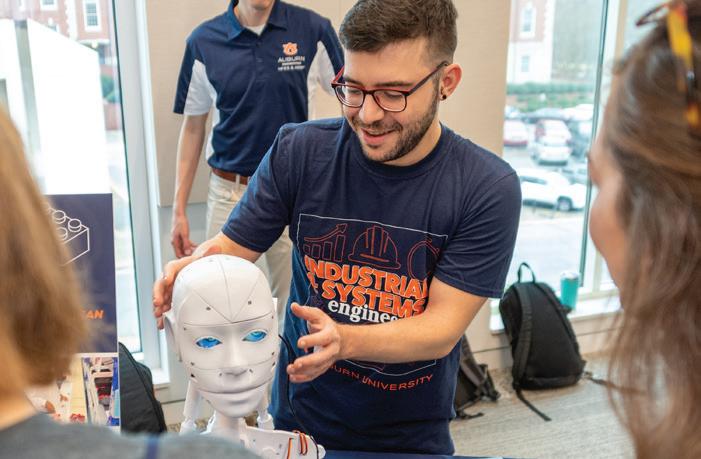

DEAN’S REPORT /// 2022-23
INDEX
Interim Dean
Steven Taylor
Director, Communications and Marketing
Austin Phillips
Editor
Cassie Montgomery
Contributors
Jeremy Henderson
Joe McAdory
Cassie Montgomery
Gracie Barranco
Paul Hollis
Art Director/Designer
Danny Doyle
Web Manager
Tyler Patterson
Photography
Marcus Kluttz
John Sluis
2022-23 Dean’s Report
The Dean’s Report is published annually by Auburn University’s Office of Engineering Communications and Marketing.
Engineering Communications and Marketing 1210D Shelby Center / Auburn, AL 36849 eng.editor@auburn.edu / 334.844.2444
© 2023 Samuel Ginn College of Engineering, Auburn University.
Auburn University is an equal opportunity educational institution/employer.
OUR VISION
To be the best student-centered engineering experience in America

To provide leading research that improves the quality of life and fosters economic competitiveness
To be a dynamic faculty and staff that exemplifies excellence and innovation
5 Dean’s Message 6 By the Numbers 12 College Leadership 16 Embodying the Mission Department Highlights 20 Aerospace Aerospace researcher makes impact on NASA’s Dart Mission 21 Biosystems Researchers reimagine controlled environment agriculture 22 Chemical Biomedical research is making a difference in patient outcomes 24 Civil and Environmental Exploring subsurface hydrogen storage to reduce CO2 emissions 25 Computer Science and Software Research aims to address software security weaknesses 26 Industrial and Systems ICAMS awarded $8.9M for smart manufacturing initiatives 38 Electrical and Computer Utilizing machine learning to improve data collection 29 Mechanical Achieving a cleaner future for the transportation sector 30 Materials Developing innovative methods for material response modification 31 Wireless Advancing fundamental understandings of wireless hierarchical federated learning 34 Faculty Highlights 36 New Faculty Members 41 Student Highlights 45 Student Support 46 Research Centers 4 SAMUEL GINN COLLEGE OF ENGINEERING CONTENTS
DEAN’S MESSAGE
It’s hard to believe it’s been a year, and my time serving as interim dean of Auburn University’s Samuel Ginn College of Engineering has come to an end. Dr. Mario Eden has been named as the college’s 14th dean, and we are all thrilled to have him lead the college into the future. I would like to thank President Chris Roberts and Provost Vini Nathan for their confidence in me to lead the college through this transition, and I am forever grateful to the students, faculty, staff and alumni who pushed forward to keep our momentum on the upward trajectory.
As Dr. Roberts announced in May, I have accepted the position as Auburn University’s senior vice president for research and economic development and will begin that appointment June 1. I am beyond excited to serve Auburn in this new capacity, and cannot wait to work with Dr. Eden as we move to double our research efforts into the future.

This past year — the college’s 150th anniversary at Auburn — as interim dean of the college has been one of the most rewarding, and challenging, of my tenure here. When I took on this role, I knew it was only for a limited time, but I knew I could affect change. Drs. Larry Benefield and Roberts built a phenomenal foundation on which we still stand, and I am proud of the efforts undertaken this year to continue to propel us forward. Just this year, we opened the doors to the Auburn University Research and Innovation Campus in Huntsville that will foster meaningful relationships for decades to come, while collaborating with our some of our most critical partners to find solutions to keep our nation safe for the next 150 years. We received approval from the Board of Trustees to build a Gulf Coast Engineering Research Station in Orange Beach, and recently installed a new 7T clinical MRI scanner — the first of its kind in this part of the country — that will allow us to conduct groundbreaking research and partner with local hospitals and clinics in ways we never have before.
Our undergraduate program continues to be ranked among the best public engineering institutions in the
nation, while our graduate program ranks third in the SEC and has climbed 10 spots in the U.S. News and World Report rankings in the past four years. For those off campus, our Online and Continuing Education program ranks No. 16 among all colleges. All three programs remain the top-ranked engineering programs in the state.
Auburn is an amazing place. This institution and community that my wife, Martha, and I have called home for more than 34 years is much more than a place where our careers flourished — it’s where we raised our children, it’s where we laid our roots and it’s where we poured our hearts and souls into making this state, this nation and this world a better place for generations to come. While the end of this chapter of my life may be bittersweet, I am so thankful for the rewarding experiences and lasting friendships forged over this past year. I remain dedicated to serving Auburn and the Ginn College of Engineering that we all love.
War
Eagle!
Steven E. Taylor
5 DEAN’S REPORT 2022-23
BY THE NUMBERS NATIONAL RANKINGS
33 rd undergraduate program ranking among public universities1
30 th national ranking in number of engineering bachelor’s degrees awarded2
31 st graduate engineering program ranking among public universities1
16 th 50 th
graduate online program ranking among all engineering colleges1 national ranking in undergraduate degrees awarded to women2
3 rd graduate online civil and environmental engineering program1
27 th
undergraduate enrollment among public universities2
46 th
national ranking by number of tenured/tenure-track faculty2
1 U.S. News & World Report rankings | 2 2021 American Society for Engineering Education data
6 SAMUEL GINN COLLEGE OF ENGINEERING
22.5%
17.2%
1 Auburn University Office of
2 Includes African American, Hispanic, American Indian or Alaska Native, Native Hawaiian or Pacific Islander students, or students of two or more races, per the National Science Foundation
7 DEAN’S REPORT 2022-23
GRADUATE STUDENTS BY PROGRAM UNDERGRADUATE STUDENTS BY PROGRAM Aerospace Biosystems Chemical Civil and Environmental Computer Science and Software Electrical and Computer Industrial and Systems Materials Mechanical Wireless Pre-engineering ENROLLMENT 1
Institutional Research
(25,379)
in the university (6,358)
20% of undergraduate students in the university
18% of graduate students
20% students in the university (31,764)
female students
5,068 580 178 424 545 1,180 531 395 28 1,168 11 47 1,150 6,218 Aerospace Biosystems Chemical Civil and Environmental Computer Science and Software Cybersecurity Data Electrical and Computer Master of Engineering Engineering Management Industrial and Systems Materials Mechanical Polymer and Fiber MASTER’S DOCTORAL 28 54 19 19 18 10 79 69 69 68 84 85 116 13 33 33 22 99 49 9 64 (1 masters / 4 doctoral) 91
underrepresented2
8 SAMUEL GINN COLLEGE OF ENGINEERING 2013 2014 2015 2016 2017 2018 2019 2020 2021 2022 5,386 4,294 4,618 4,968 4,963 5,282 5,559 5,579 2013 2014 2015 2016 2017 2018 2019 2020 2021 2022 1,116 885 921 851 899 976 942 1,003 519 master’s 617 doctoral 14 certificate FRESHMAN CLASS SNAPSHOT
2022 1,237 students 29 average ACT 4.13 average high school GPA UNDERGRADUATE ENROLLMENT GRADUATE ENROLLMENT GRADUATE SNAPSHOT 24% female students 5,153 5,068 1,176 1,150
Fall
STRATEGIC RESEARCH AREAS
Advanced Manufacturing and Materials
Infrastructure and Transportation
Cybersecurity and Intelligent Systems
Energy and Environment
Biomedical and Health Systems
RESEARCH SNAPSHOT
$86 MILLION in research expenditures
FACULTY SNAPSHOT
RESEARCH EXPENDITURES (IN MILLIONS)
190 tenured/tenure track faculty
47 non-tenure track teaching/research faculty
15 postdoctoral researchers/fellows
9 DEAN’S REPORT 2022-23
2012 $60.1 2013 $61.3 2014 $60.0 2015 $58.3 2016 $61.7 2017 $62.6 2018 $64.3 2019 $65.6 2020 $72.9 2021 $78.2 2022 $86.0
HIGH PROFILE RESEARCH AREAS
Funding awarded in 2022
Transportation Engineering: $4,700,000
Additive Manufacturing: $9,000,000
Autonomy and Assured Positioning, Navigation and Timing: $2,000,000
Micro and Nano Electronics: $4,900,000
Biomedical and Health Systems Engineering: $2,800,000
RESEARCH AWARD HIGHLIGHTS
2022
$9,009,631
Alabama Department of Conservation and Natural Resources
“AU Gulf Coast Engineering Research Station”
Joel Hayworth (civil and environmental engineering)
$1,862,255
National Institutes of Health R35 award
“Development of Computational Tools For Accounting For Host Variability In Predicting T-Cell Epitopes”
Christopher Kieslich (chemical engineering)
$460,736
National Science Foundation
“CAREER: Harnessing External Knowledge to Improve Computer Vision Robustness, Explainability and User Accuracy”
Anh Nguyen (computer science and software engineering)
$450,000
NextFlex
“In-Mold Electronics Interconnection and Thermoforming For 3D-Integrated Applications”
Pradeep Lall (Center for Advanced Vehicle Electronics)
$1,865,315
National Institutes of Health R35 award
“Cell Mechanoresponses In Physiologically Relevant Microenvironments” Panagiotis Mistriotis (chemical engineering)
$2,496,423
National Institutes of Health R01 award
“Engineered Colon Cancer Tissue To Examine The Impact Of The Obese Microenvironment”
Elizabeth Lipke (chemical engineering)
$500,000
National Science Foundation
“CAREER: Towards Efficient & Fast Hierarchical Federated Learning In Heterogenous Wireless Edge Networks” Xiaowen Gong (electrical engineering)
$749,999
Department of Energy
“DOE CAREER: Mechanisms Of Hydrogen Interaction With Earth Materials Subsurface Formations”
Lauren Beckingham (civil and environmental engineering)
$589,889
National Science Foundation
“RET Site: Project-Based Learning for Rural Alabama STEM Middle School Teachers in Machine Learning and Robotics”
Xiaowen Gong (electrical engineering), Thaddeus Roppel (electrical engineering) and Daniela Marghitu (computer science and software engineering)
10 SAMUEL GINN COLLEGE OF ENGINEERING
ACADEMIC DEPARTMENTS AND DEGREES
AEROSPACE ENGINEERING
Bachelor of Aerospace Engineering
Master of Science in Aerospace Engineering
Ph.D. in Aerospace Engineering
BIOSYSTEMS ENGINEERING
Bachelor of Biosystems Engineering
Bachelor of Biosystems Engineering
Ecological Engineering Option
Bachelor of Biosystems Engineering
Forest Engineering Option
Bachelor of Biosystems Engineering
Bioprocess Engineering Option
Master of Science in Biosystems Engineering
Ph.D. in Biosystems Engineering
CHEMICAL ENGINEERING
Bachelor of Chemical Engineering
Master of Science in Chemical Engineering
Ph.D. in Chemical Engineering
CIVIL AND ENVIRONMENTAL ENGINEERING
Bachelor of Civil Engineering
Master of Science in Civil Engineering
Master of Civil Engineering
Ph.D. in Civil Engineering
COMPUTER SCIENCE AND SOFTWARE ENGINEERING
Bachelor of Computer Science
Bachelor of Science in Computer Science
Bachelor of Software Engineering
Master of Science in Computer Science and Software Engineering
Master of Science in Cybersecurity Engineering
Ph.D. in Computer Science and Software Engineering
ELECTRICAL AND COMPUTER ENGINEERING
Bachelor of Electrical Engineering
Bachelor of Computer Engineering
Master of Science in Electrical Engineering
Ph.D. in Electrical Engineering
INDUSTRIAL AND SYSTEMS ENGINEERING
Bachelor of Industrial and Systems Engineering
Master of Science in Industrial and Systems Engineering
Master of Industrial and Systems Engineering
Master of Engineering Management
Ph.D. in Industrial and Systems Engineering
MATERIALS ENGINEERING
Bachelor of Materials Engineering
Master of Science in Materials Engineering
Ph.D. in Materials Engineering
MECHANICAL ENGINEERING
Bachelor of Mechanical Engineering
Master of Science in Mechanical Engineering
Ph.D. in Mechanical Engineering
WIRELESS ENGINEERING
Bachelor of Wireless Engineering
INTERDEPARTMENTAL PROGRAMS
Master of Engineering
Master of Science in Polymer and Fiber Engineering
Master of Science in Data Science and Engineering – Interdisciplinary
Ph.D. in Polymer and Fiber Engineering
Ph.D. in Earth System Science – Interdisciplinary
11 DEAN’S REPORT 2022-23
LEADERSHIP
Brad Christopher Chair
Gerald Pouncey Vice Chair








Shirley Boulware At Large
Jim Cooper At Large
Nicole Faulk Nominating
Maury Gaston Government Affairs
Carol Godfrey Diversity and Inclusion


Melissa Herkt Young Alumni Council Liaison
Kenneth Kelly Immediate Past Chair

Mark Miller Research
Larry Monroe At Large
Bobby Keith Development
Ashely Robinett At Large
Ken Smith Academics and Student Experience
Jeff Stone Capital Campaign Committee
K-Rob Thomas Public Relations
Walt Woltosz Second Past Chair


12 SAMUEL GINN COLLEGE OF ENGINEERING
AUBURN ALUMNI ENGINEERING COUNCIL 2022-23 EXECUTIVE COMMITTEE
Steve Taylor Interim Dean
Brian Thurow Aerospace Engineering Chair
Mark Nelms Electrical and Computer Engineering Chair
Jeffrey Fergus Associate Dean for Undergraduate Studies and Program Assessment
Oladiran Fasina Biosystems Engineering Head
Gregory Harris Industrial and Systems Engineering Chair
Maria Auad Associate Dean for Graduate Studies and Faculty Development
Mario Eden Chemical Engineering Chair
Jeff Suhling Mechanical Engineering Chair
Allan David Acting Associate Dean for Research
Andrzej Nowak Civil and Environmental Engineering Chair
Janet Moore Assistant Dean for Student Services
Hari Narayanan Computer Science and Software Engineering Chair
EDEN NAMED DEAN OF COLLEGE OF ENGINEERING
Following a national search, Mario Eden, the Joe T. and Billie Carole McMillan Professor and chair of Auburn University’s Department of Chemical Engineering, has been named as the 14th dean of the Samuel Ginn College of Engineering, according to an announcement by Provost Vini Nathan.
Eden was selected following an extensive interview and public process that included a diverse pool of nearly 60 applicants from some of the nation’s most premier and highly ranked engineering institutions. He began serving in this new role effective May 15.
“The quality of applicants and applications we received from across the country is testimony to the stature of the Samuel Ginn College of Engineering,” Nathan said. “After carefully reviewing feedback from the search committee, faculty, staff, students, alumni and AU leadership, it was apparent that Dr. Eden is the person we need leading the College of Engineering forward. I am confident that, through his leadership, he will help elevate the college to become one of the preeminent engineering institutions in the country.”
Eden succeeds Steve Taylor, who was named as interim dean in April 2022 when then-Dean Chris Roberts was named as Auburn University’s 21st president. Taylor has accepted the role as Auburn’s senior vice president for research and economic development, and will begin that appointment June 1.

“Dr. Taylor is a consummate professional, and Auburn is indebted to him for his thoughtful leadership, dedication and commitment during this interim period,” Nathan said.
Eden served as chair and professor of the Department of Chemical Engineering since 2012, as an associate professor from 2008-12 and as an assistant professor from 2004-08. From 2014-16, he also served a term as acting director of the Alabama Center for Paper and Bioresource Engineering. As the chemical engineering department chair, Eden led the department to its highest U.S. News & World Report Graduate Program
ranking ever; increased undergraduate enrollment to record numbers with incoming freshmen with ACT scores of 30 or higher for 11 years in a row; successfully added 17 tenure-track faculty members and two full-time lecturers during the past 10 years, including the department achieving the highest percentage of female full professors among any chemical engineering department in the country; increased philanthropic support of the program by millions of dollars; and successfully led the department through the national accreditation process in 2016 and 2022.
Eden earned master’s and doctoral degrees in chemical engineering from the Technical University of Denmark in 1999 and 2003, respectively. His expertise and research interests center on process systems engineering and computer-aided process engineering; process simulation, design, integration and optimization; and product and molecular synthesis/ design. Eden has established a strong record of scholarly productivity and academic achievement, including more than 165 refereed publications and nearly 450 invited talks and conference presentations. He has secured more than $29 million in extramural grants and contracts as principal investigator (PI) or co-PI from a wide range of federal and industrial sources.
“Serving Auburn University’s Samuel Ginn College of Engineering and the Department of Chemical Engineering has been one of the greatest blessings of my life,” Eden said. “I am so thankful for the chemical engineering department faculty, staff, students and alumni for the past decade, and I am humbled at this opportunity to take Auburn Engineering to the next level. This is truly a group effort, and together we can achieve even greater things because we believe in Auburn, and love it.”
13 DEAN’S REPORT 2022-23
Mario Eden
FELLOWS IN THE COLLEGE OF ENGINEERING
AEROSPACE ENGINEERING
John Cochran
American Institute of Aeronautics and Astronautics (AIAA)
Roy Hartfield
American Society of Mechanical Engineers (ASME)
BIOSYSTEMS ENGINEERING
William Batchelor
American Society of Agricultural and Biological Engineers (ASABE)
Oladiran Fasina ASABE
Steven Taylor ASABE
CHEMICAL ENGINEERING
Harry Cullinan
Technical Association of the Pulp and Paper Industry
Thomas Hanley
American Institute of Chemical Engineers (AIChE)
Joseph Shaeiwitz
AIChE; American Society of Engineering Education (ASEE)
Bruce Tatarchuk
National Academy of Inventors (NAI)
CIVIL AND ENVIRONMENTAL ENGINEERING
Robert Barnes
American Concrete Institute (ACI)
Xing Fang
American Society of Civil Engineers (ASCE); Environmental and Water Resources Institute
Andrzej Nowak
ASCE; ACI, International Association for Bridge and Structural Engineering
Anton Schindler
ACI; ASCE
Huaguo Zhou Institute of Transportation Engineers
COMPUTER SCIENCE AND SOFTWARE ENGINEERING
Daniela Marghitu
Society for Design and Process Science
Levent Yilmaz
Society for Modeling and Simulation International
ELECTRICAL AND COMPUTER ENGINEERING
Prathima Agrawal Institute of Electrical and Electronics Engineers (IEEE)
Vishwani Agrawal IEEE
Fa Foster Dai IEEE; NAI
Charlie Gross
IEEE
Mark Halpin
IEEE
John Hung
IEEE
Dave Irwin
IEEE; NAI
14 SAMUEL GINN COLLEGE OF ENGINEERING
Dick Jaeger
IEEE
Hulya Kirkici
IEEE
Shiwen Mao
IEEE
Mark Nelms
IEEE
Adit Singh
IEEE
Jitendra Tugnait
IEEE
Dan Wilamowski
IEEE
John Wu
IEEE
INDUSTRIAL AND SYSTEMS ENGINEERING
John Evans
Luminary, Surface Mount Technology Association (SMTA)
Sean Gallagher
American Industrial Hygiene Association (AIHA); Human Factors and Ergonomics Society
Chan Park
Institute of Industrial and Systems Engineers (IISE)
Jeff Smith
IISE
Alice Smith
IISE; IEEE; Institute for Operations Research and Management Science
Rob Thomas
AIHA
MECHANICAL ENGINEERING
Bryan A. Chin
ASM International; American Nuclear Society; American Welding Society; Electrochemical Society
Malcolm Crocker
Acoustical Society of India; Acoustical Society of America
Jeffrey Fergus
Electrochemical Society; ABET
George Flowers
ASME
Rob Jackson
ASME
Jay Khodadadi
Associate AIAA; ASME
Pradeep Lall
Alabama Academy of Sciences; Institute of Electrical and Electronics Engineers; ASME; NextFlex
P. K. Raju
ASME; American Society of Engineering Education; Acoustical Society of India; The Institution of Engineers, India
Subhash Sinha
ASME; Associate AIAA
Jeffrey Suhling
ASME
Hareesh Tippur
Society of Experimental Mechanics; ASME
15 DEAN’S REPORT 2022-23
EMBODYING THE MISSION
Research
TAKING RESEARCH TO THE NEXT LEVEL BY CASSIE MONTGOMERY
Jin Wang, the Walt and Virginia Woltosz Professor of chemical engineering, was named the 2022 recipient of the Creative Research and Scholarship Award, Auburn’s highest research honor for faculty. The award recognizes those faculty members who have distinguished themselves through research, scholarly works and creative contributions. Wang’s award is in the sciences, biomedical sciences, engineering and agriculture category.
With an innovative focus on process identification and control, systems biology and biochemical engineering, her research portfolio in the Samuel Ginn College of Engineering has blossomed over the past 16 years. Projects under Wang’s leadership have included studies on smart manufacturing, biogas conversion and the process of turning organic agricultural waste into bioplastics.
Wang’s research has received funding from a wide variety of sources, including the National Science Foundation, U.S. Department of Energy, U.S. Department of Education, U.S. Department of Agriculture, U.S. Department of Transportation and the Alabama Commission on Higher Education.
As one of the few female faculty to have received the Creative Research and Scholarship Award, Wang hopes she is setting a positive example for female students at Auburn.

“I am really thrilled. It’s validation, not just for myself, but for my students in the past and present,” she said.
“And if you look in the past, not many female researchers have received this award, so I hope that I can be an encouragement to others,” she added.
16 SAMUEL GINN COLLEGE OF ENGINEERING
Outreach
MAKING A COMMUNITY IMPACT
BY JEREMY HENDERSON
Pedestrian deaths are a growing problem in Alabama. Rod Turochy, Associate Director for Outreach for the Auburn University Transportation Research Institute, says more accessible sidewalks in 10 Black Belt communities could be part of the solution.

Thanks to a $1.3 million grant in federal funding through the U.S. Department of Transportation’s RAISE (Rebuilding America’s Infrastructure with Sustainability and Equity) program, Auburn’s “Step Up Alabama” initiative will provide for community engagement, planning and design of pedestrian facility improvement projects in Demopolis, Eufaula, Eutaw, Enterprise, Georgiana, Greenville, Opp, Selma, Troy and Tuskegee.
“2021 saw the most pedestrian fatalities in Alabama in five years,” said Turochy, the James Madison Hunnicutt Professor in traffic engineering. “But even across the country, pedestrians continue to bear a disproportionate share of pain and suffering in traffic
incidents. Drivers are growing more distracted, and sales of SUV and pickups are growing, which means the average vehicle is heavier and taller. Vehicles aren’t only hitting people in the knees and legs anymore, pedestrians are more often being struck in their torsos.”
Combining these new realities with pedestrian infrastructure that has remained mostly untouched for decades makes many of Alabama’s underresourced areas especially prone to pedestrian injuries and fatalities. Since the data show that people of color and lower-income communities experience a disproportionate share of these incidents, improvements to pedestrian facilities should substantially improve safety in these areas.
“This project will support a more sustainable and equitable transportation system by improving pedestrian safety,” Turochy said. “We will make a difference in these communities.”
17 DEAN’S REPORT 2022-23
Teaching
COMMITTED TO INSTRUCTIONAL EXCELLENCE
BY GRACIE BARRANCO
Jeffrey LaMondia, professor of civil and environmental engineering, is widely known and appreciated for his engaging and supportive teaching style, so it did not come as a shock when he was awarded the 2022 William F. Walker Teaching Award.

The award, which is the highest honor for instruction in the Samuel Ginn College of Engineering, recognizes outstanding achievement by faculty members involved in the education of Auburn Engineering students.
“I love engaging with students and seeing them excel in the classroom and beyond. There are so many ways to support students – from activities like Engineer Together Day to evening Fundamentals of Engineering Exam Review Sessions to just listening to student concerns,” LaMondia said. “I hope students recognize my enthusiasm for the department, college and especially for them.”
It is safe to say his students do recognize his enthusiasm. One student of LaMondia’s, Corrinne Arcenal, a graduate student studying transportation engineering, said “everyone agrees that one of the best things about having Dr. LaMondia as a professor is his passion and excitement. As an adviser, he sets the bar high - he’s positive and encouraging. Personally, Dr. LaMondia has taught me to be a better writer, a thoughtful researcher and, overall, a more confident engineer.”
To receive the Walker Teaching Award requires obtaining a letter of support from the department chair plus three additional letters of support, providing current curriculum, participating in intensive lecturing evaluation and more.
“The Walker Teaching Award has always been an aspirational goal of mine, so to receive it is just humbling,” LaMondia said.
18 SAMUEL GINN COLLEGE OF ENGINEERING



VISIT OUR CAMPUS! TAKE AN ENGINEERING VIRTUAL TOUR aub.ie/360engtour SCAN ME SEARCH #GINNING ON THE APPS ABOVE /// ENG.AUBURN.EDU/GINNING THE BEST PODCAST IN HIGHER EDUCATION
AEROSPACE
AEROSPACE RESEARCHER MAKES IMPACT ON NASA’S DART MISSION
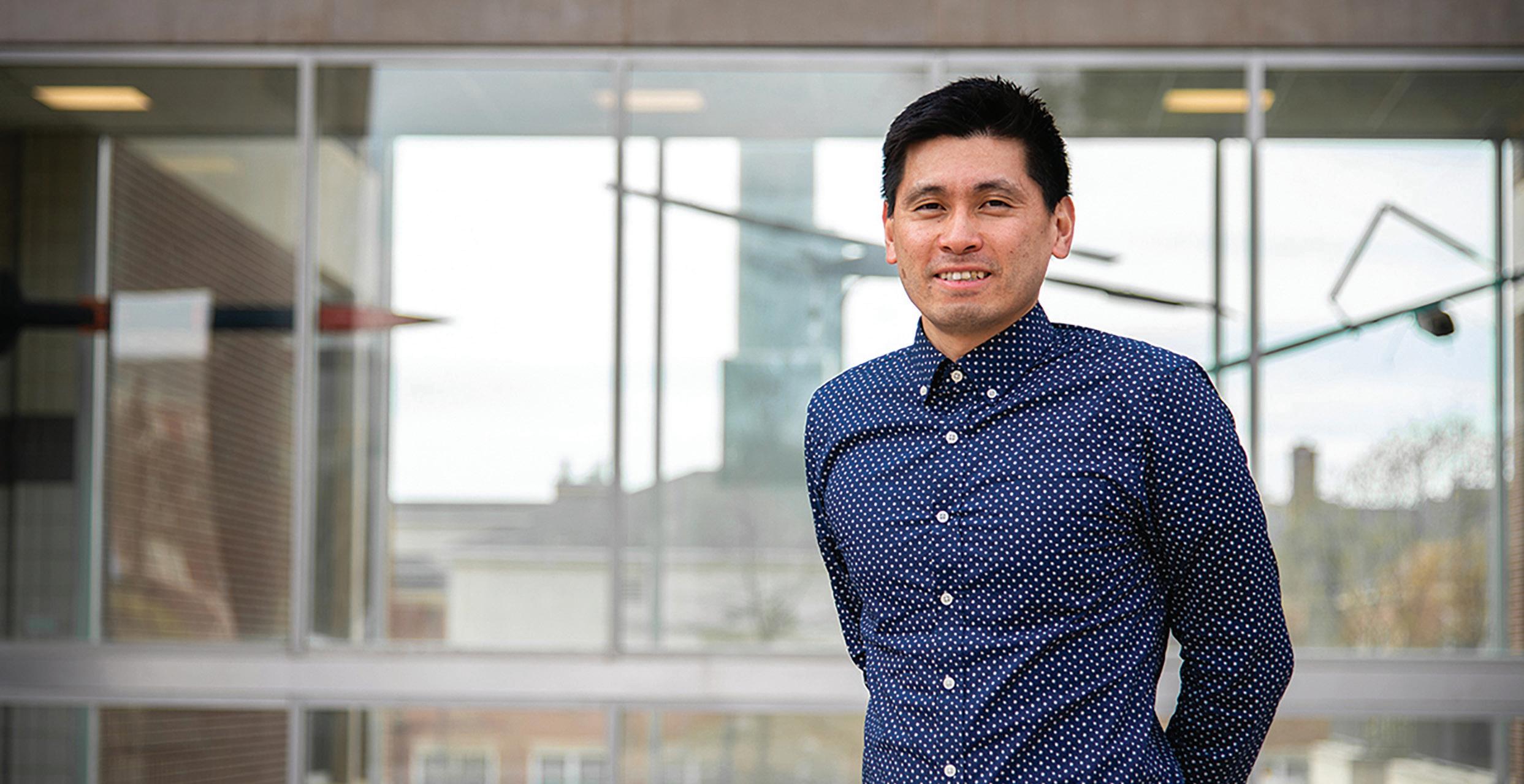 BY JOE MCADORY
BY JOE MCADORY
Masatoshi Hirabayashi
Assistant Professor
334.844.5220
thirabayashi@auburn.edu
aub.ie/MHirabayashi
Masatoshi Hirabayashi is among a team of NASAsupported scientists who analyzed if intentionally crashing a human-made object into a celestial object would change its trajectory.

NASA’s 1,345-pound Double Asteroid Redirection Test (DART) spacecraft launched in November 2021 in California and intentionally collided with Dimorphos — the moon of asteroid Didymos — in September 2022.
“The research is to assess how effective and efficient the kinetic impact would be,” said Hirabayashi, who is a co-investigator on the DART mission team, which is led by the Johns Hopkins University Applied
Physics Laboratory (APL) on behalf of NASA. “This mission is at the core of planetary defense. My role is to characterize this efficiency by looking at actual dynamic motion of the asteroid responding to the DART impact.”
Hirabayashi said impact occured at roughly 15,000 mph when Dimorphos was closest to the earth (6.8 million miles away). Scientists observed the impact from the ground via telescopes. After DART’s impact, Hirabayashi’s responsibilities accelerated and will continue for a full year. Hirabayashi spent a month at APL in Laurel, Maryland continuing his research.
“These studies will provide the perfect foundation for future planetary defense research in the area of asteroid redirection,” said Hirabyashi.
“This is very thrilling for me, personally, and is great for Auburn University to be a part of this important mission that could provide data to help play a role in deflecting an asteroid from crashing into the earth. I’m really excited to have been part of the DART team for the past five years.”
20 SAMUEL GINN COLLEGE OF ENGINEERING
BIOSYSTEMS
RESEARCHERS REIMAGINE CONTROLLED ENVIRONMENT AGRICULTURE
BY PAUL HOLLIS
Brendan Higgins
Associate Professor

334.844.3532
bth0023@auburn.edu
aub.ie/BHiggins
While controlled environment agriculture (CEA) has the potential to improve access to local, nutritious fruits and vegetables on a year-round basis, the greenhouse gas emissions associated with greenhouse production is five times higher than fieldgrown produce.
For this reason, researchers at Auburn University are embarking on a wide-ranging and ambitious mission to reimagine CEA as a more sustainable approach to food production.

The project, entitled “Reimagining Controlled Environment in a Low-Carbon World,” is the focus
of a $9.95 million grant recently awarded to Auburn by the U.S. Department of Agriculture’s National Institute of Food and Agriculture’s Sustainable Agriculture Systems program.
“CEA must be reimagined to become a sustainable approach to food production,” said Brendan Higgins, associate professor in the Department of Biosystems Engineering and project director. “Our team’s long-term goal is to transform CEA strategically, managerially, technologically and socially to position it as a viable food production system capable of producing sufficient and nutritious foods within the low-carbon economy.”
The Auburn research team will engage in research, extension and educational activities that align with four over-arching strategies to lower the carbon intensity of CEA: reduce demand for heating and cooling in CEA; improve efficiency of CEA climate control; lower the carbon intensity of resource inputs; and shift consumer and producer behavior surrounding CEA products and practices.
21 DEAN’S REPORT 2022-23
CHEMICAL
BIOMEDICAL RESEARCH IS MAKING A DIFFERENCE IN PATIENT OUTCOMES
BY CASSIE MONTGOMERY
Panagiotis Mistriotis
Assistant Professor
334.844.5457
pmistriotis@auburn.edu
aub.ie/PMistriotis
Robert Pantazes
Assistant Professor
334.844.4805
rjp0029@auburn.edu
aub.ie/RPantazes
Researchers in the Department of Chemical Engineering are delving into some of the world’s most challenging health issues.
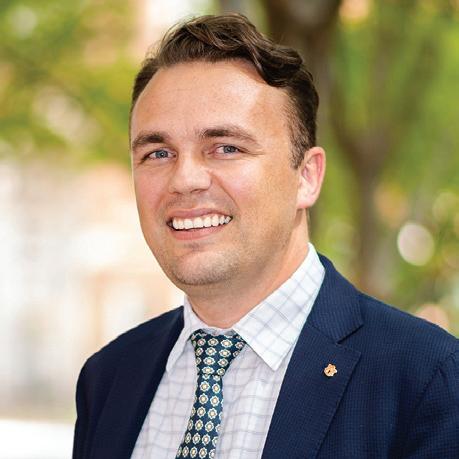

With the goal of improving patient outcomes through personalized medicine and expanding access to medical advances to the developing world, with backing by some of the biggest funding agencies in the industry.
Chris Kieslich
Assistant Professor

334.844.4827
cak0071@auburn.edu
aub.ie/CKieslich
IMPROVING PATIENT OUTCOMES
Personalizing medicine and therapeutics to an individual patient has the potential to address many health issues from cancer and cardiovascular disease to fighting antibiotic resistant bacteria. Through the work of chemical engineering assistant professors Robert Pantazes and Panagiotis Mistriotis — both supported through R35 National Institutes of General
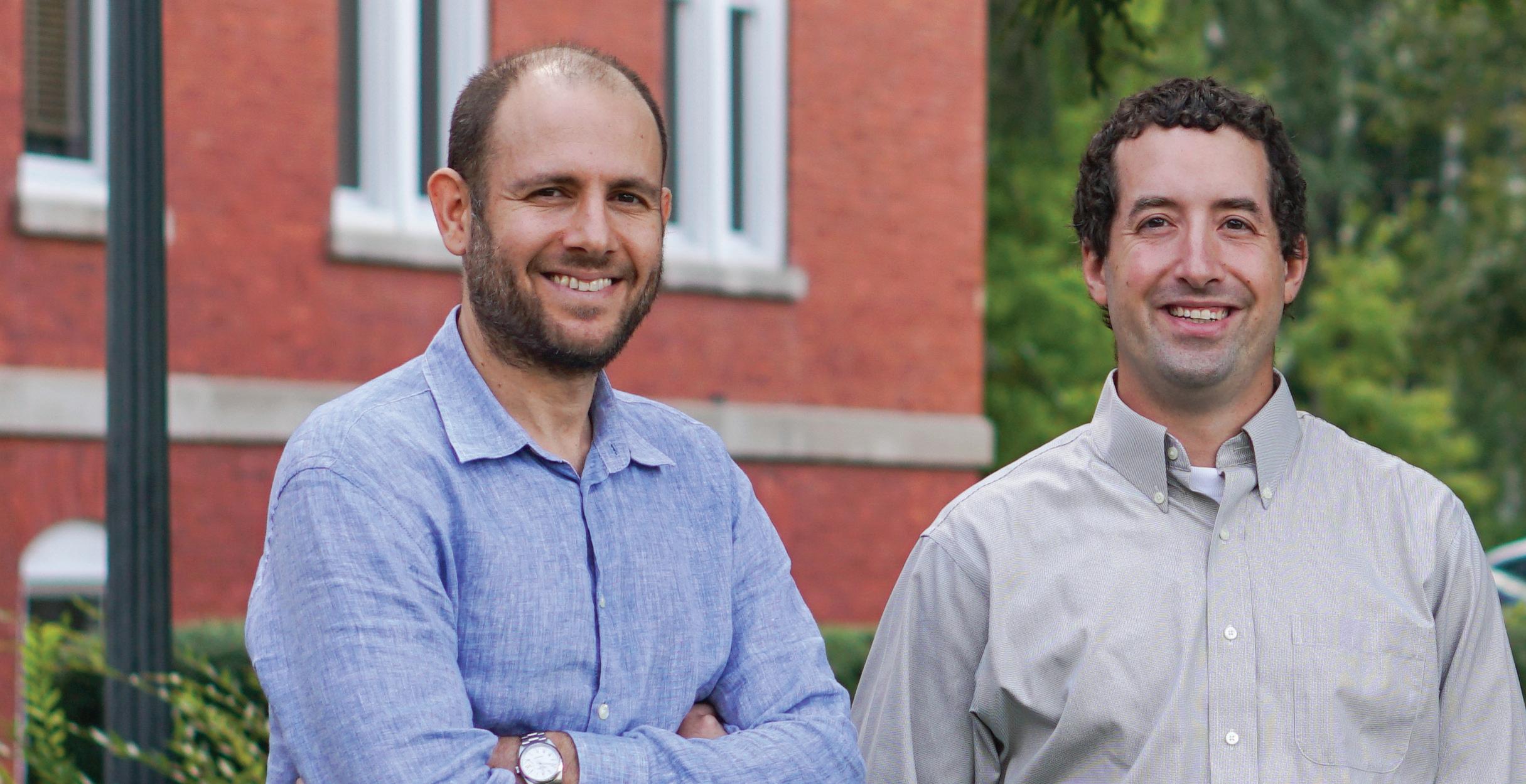
22 SAMUEL GINN COLLEGE OF ENGINEERING
Medical Sciences Maximizing Investigators’ Research Awards of $1.75 million and $1.87 million, respectively — advances in personalized medicine are on the horizon.
Pantazes’s research focuses on developing and experimentally testing computational methods to design therapeutic proteins. In his lab, he and his graduate students are examining how to design antibodies better and faster than traditional approaches.
Mistriotis’s approach lies in the field of mechanobiology and will further examine fundamental cellular processes to develop novel therapeutic interventions against the initiation and progression of pathophysiological phenomena, including cardiovascular disease, aging and cancer. As a field of study, mechanobiology is concerned with the mechanisms by which cells sense and respond to mechanical signals. Mistriotis noted that cells in the human body are constantly subjected to these signals, but researchers aim to learn more about how these signals impact cell behavior.
“The widely held view is that cells can sense and respond to these cues but our understanding of the underlying mechanisms remains very limited,” he said. “Our lab explores how physical forces convert into biochemical signals to influence cell behavior.”
EXPANDING ACCESS TO THE DEVELOPING WORLD
The future of vaccine development is going to be faster, cheaper and more geared toward the needs of the developing world. The technology behind the vaccines of the future will be impacted by the work of Chris Kieslich, assistant professor of chemical engineering.
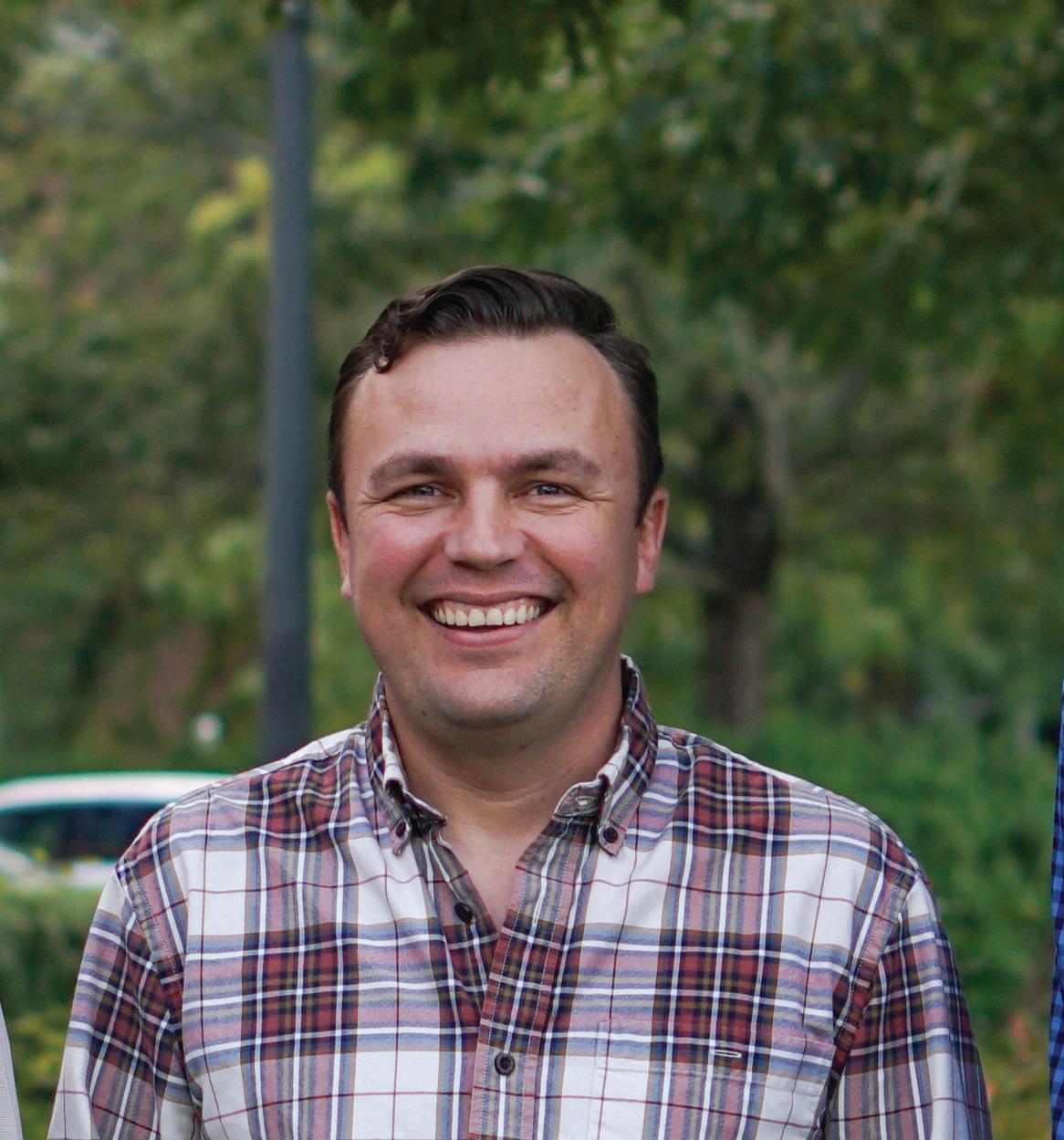
Kieslich is the Department of Chemical Engineering’s latest recipient of the R35 Maximizing Investigators’ Research Award (MIRA) from the National Institute of General Medical Sciences. Kieslich’s five-year, $1.87 million award for his work titled “Development of computational tools for accounting for host variability in predicting T-cell epitopes” marks the department’s third MIRA in two years, alongside Mistriotis and Pantazes.
“What we’re working on through computation is making tools that would be useful for designing new vaccines with a variety of applications that could be developed faster or cheaper because they’re easier to produce and store,” Kieslich said. “In very basic terms, we are developing tools that understand the interactions between a pathogen, such as a virus or bacteria, and the receptors in the immune system.”
The MIRA funding will allow his research team stability and flexibility to enhance scientific productivity and the chances for important research breakthroughs.
“Take COVID for example. So much of the data we have is from the Western world and because of that, the models perform very well for people of those genetic backgrounds but not so much with other parts of the world,” Kieslich said. “Part of what we’re trying to do is develop our models in a way that will allow us to make it accessible for larger parts of the population. Having a platform or a way of developing vaccines that can be tailored for a specific population or individual is a huge possible outcome of our research but we’re really starting at the basic science.”
23 DEAN’S REPORT 2022-23
CIVIL AND ENVIRONMENTAL EXPLORING SUBSURFACE HYDROGEN STORAGE TO REDUCE CO 2 EMISSIONS
BY JEREMY HENDERSON
Lauren Beckingham
W. Allen and Martha Reed Associate Professor 334.844.6260
leb0071@auburn.edu aub.ie/LBeckingham
Lauren Beckingham, W. Allen and Martha Reed Associate Professor of civil and environmental engineering received her latest Early Career honor from the Department of Energy (DOE), which awarded $749,999 toward her research into subsurface hydrogen storage.

The project is a promising means of large-scale, long-term energy storage that could boost renewable energy and reduce atmospheric CO2 emissions.
Beckingham, who in 2019 received the National Science Foundation Faculty Early Career Development award for research into improving simulation of
mineral reaction rates, is the Samuel Ginn College of Engineering’s second DOE Early Career Award winner and only the third at Auburn University.

“A lot of great people apply for these programs and there are not a lot of awards, so I’m humbled and thankful for the support of a great group of students and postdocs, colleagues and mentors,” Beckingham said.
The five-year project will support laboratory experiments considering H2-brine-mineral interactions at field site conditions, elevated temperatures and pressures.
“Subsurface hydrogen storage in geologic formations is an emerging technology and there is much to be learned to understand the security, success and efficiency of these systems,” Beckingham said.
“We hope to fill some of these knowledge gaps by considering potential interactions between injected H2, formation fluids and earth materials,” she added.
24 SAMUEL GINN COLLEGE OF ENGINEERING
COMPUTER SCIENCE AND SOFTWARE
RESEARCH AIMS TO ADDRESS SOFTWARE SECURITY WEAKNESSES
BY JOE MCADORY
Akond Rahman
Assistant Professor
334.844.6352
akond@auburn.edu
aub.ie/ARahman
Akond Rahman, assistant professor in computer science and software engineering, was awarded two National Science Foundation (NSF) awards as lead principal investigator totaling $332,000 in grant funding.
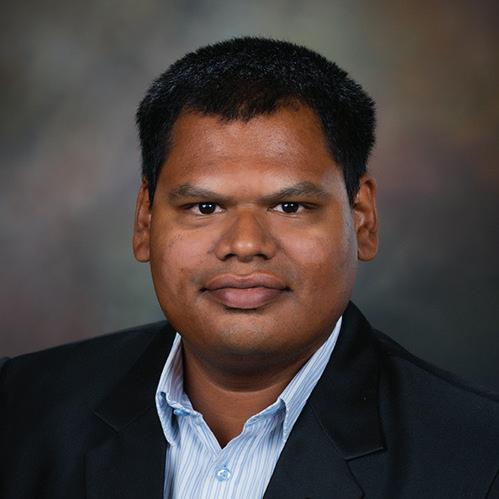

His projects focus on the development of techniques that will automatically detect security weaknesses in configuration scripts.
It will also educate students on the consequences of security weaknesses commonplace in development and operations (DevOps) software and how to mitigate them.
“DevOps is the state-of-the-art process to develop software,” Rahman said. “And is expected to reach a market value of $12.8 billion by 2025. If there are unmitigated security weaknesses in DevOps artifacts, that will create large-scale consequences.”
His research is a three-pronged thrust for one of the NSF-funded projects. First, qualitative analysis will be applied to determine a comprehensive list of security weaknesses for multiple configuration script languages and devise static analysis techniques for automatically identifying each category of security weakness.
Next, grammar-based parsing and formal method techniques will be applied and integrated into the derived static analysis so that false positives are reduced.
“Finally, the development context of practitioners from the open source and proprietary domain will be systematically mined to generate actionable alerts and suggestions, which will enable practitioners to fix security weaknesses,” Rahman said.
25 DEAN’S REPORT 2022-23
INDUSTRIAL AND SYSTEMS
ICAMS AWARDED $8.9M FOR SMART MANUFACTURING INITIATIVES
BY JEREMY HENDERSON
Gregory Harris Department Chair

334.844.1407
gah0015@auburn.edu
aub.ie/GHarris
The adoption of Smart Manufacturing is fast becoming a necessity for small and medium-sized manufacturers (SMMs) looking to stay competitive in the Industry 4.0 age. For those SMMs in the national security ecosystem, it’s no longer a suggestion — it’s a requirement. Enter, once again, the Interdisciplinary Center for Advanced Manufacturing Systems (ICAMS) at Auburn University.
Established in 2020 to help SMMs bridge the digital divide that threatens to render 85% of the American industrial base obsolete over the next decade, the center will use a significant portion of its latest and largest award from the Department of Defense’s
Greg Purdy Assistant Professor

334.844.1390
greg.purdy@auburn.edu aub.ie/gpurdy
(DoD) Office of Industrial Policy’s Industrial Base Analysis and Sustainment (IBAS) Program, $8.9 million, to leverage its research and outreach efforts promoting advanced manufacturing in small and medium manufacturing operations
“We have to provide SMMs a better understanding of the processes behind new guidelines and best practices necessary to engage in secure work for the DOD,” said principle investigator (PI) Greg Purdy, assistant professor in the Department of Industrial and Systems Engineering. “With this grant, we can equip them with the tools necessary to produce parts in a classified manufacturing environment.”

26 SAMUEL GINN COLLEGE OF ENGINEERING
Whereas, a decade ago, cyber threats were generally exclusive to information and technology (IT) systems, Purdy says that the operational infrastructure of manufacturers is now being directly targeted by malicious actors.
“These days, SMMs can no longer rely on just basic cybersecurity,” Purdy says. “They need to meet even more stringent requirements to protect sensitive information. But some of these smaller organizations and companies, those with under 50 employees, may not think they’re able to offer that level of protection — they may not currently have the resources to.”
Co-PI Gregory Harris, ICAMS director and chair of the Department of Industrial and Systems Engineering, agrees.
“Data integration and analysis in a classified manufacturing environment (CME) is daunting to most SMMs,” Harris said of the issue. “Many are choosing to forego the increased productivity and improved quality available through the application of digital manufacturing technologies because they are worried about the potential for data to escape. During conversations with SMMs, the topic of classified advanced manufacturing continues to be a subject and source of consternation for the nation’s defense industrial base.”
To combat these reservations, ICAMS is creating a CME within its 20,000 square-foot state-of-the-art facility. Located on Pumphrey Avenue in Auburn, the ICAMS production environment already houses waterjet, laser cutting capabilities and welding infrastructure. The ICAMS facility also features dedicated resources in some of the fastest-growing manufacturing sectors, including a 4-axis friction stir welder and a Swiss-style machining center, allowing the center to support a wide range of manufacturing organizations. A Digital Manufacturing Demonstration Cell and Cyber-physical Machining Range is also underway.
However, Harris says that even with the barriers of entry to Industry 4.0 lowered, many SMMs may still find defense manufacturing contracts both a blessing and a curse.
“When demand for a defense part is high, many SMMs add capacity to meet the demand, but then the surge ends, and part orders decrease, even to zero,” Harris said. “Now the SMM has a problem with excess capacity and costs. This feast or famine cycle has been the cause of many SMMs going out of business. The question ICAMS aims to answer is how to address this challenge by developing strategies that allow SMMs to manage the production of parts for the DoD while still maintaining capabilities to produce for commercial markets. Traditionally, this requires duplicating machines and other resources to enable an organization to produce for both markets. However, this tends to disproportionately impact SMMs that may not have the financial capital to duplicate their manufacturing systems. Having unutilized equipment directly affects their ability to stay in business.”
To address this particular challenge, ICAMS will also use the DoD award to develop a Hybrid-Secure Manufacturing (HSM) cell to showcase a flexible manufacturing environment that can produce parts supporting DoD contracts and be quickly reconfigured to produce parts on general commercial contracts.
“This will highlight the security considerations and necessary architecture to allow SMMs flexible DoD and commercial manufacturing at SMMs,” Harris said. “But it will also be valuable in workforce development. We’ll be able to train organizations from the shop floor to the c-suite level. It’s an approach that can help manufacturers understand the business case for HSM through firsthand experience.”
Other tasks the award will help accomplish include ICAMS’ SMM Prototyping Assistance Program, and a technology adoption seed program offering SMMs willing to implement smart manufacturing up to $50,000 in matching funds, an approach that has proven highly successful in South Korean industrial digitization initiatives.
Other co-PIs include Lewis Payton, Peter Liu, Konstantinos Mykoniatis, Yadrianna Acosta-Sojo, Mark Schall, Daniel Silva Izquierdo and Erin Garcia, all faculty in the Department of Industrial and Systems Engineering.
27 DEAN’S REPORT 2022-23
ELECTRICAL AND COMPUTER UTILIZING MACHINE LEARNING TO IMPROVE DATA COLLECTION
BY JOE MCADORY
our department and will further inspire our team of graduate students.”
Yin Sun Assistant Professor 334.844.1867
yzs0078@auburn.edu aub.ie/YSun
Fresh data is vital to operators because it is timely. Important data is vital to operators because it’s necessary for quick decision-making. Can machines learn to provide both sets of data simultaneously? Yin Sun, assistant professor in electrical and computer engineering, believe they can — and will prove it through his newest proposal, “Semantic and Goaloriented Status Updating for Inference, Monitoring, and Decision-Making,” through a $516,000 National Science Foundation (NSF) CAREER Award.
“This is a very special and important recognition of my work,” Sun said. “Earning an NSF CAREER Award is great recognition for the university, the college,

Sun becomes the department’s third CAREER Award winner in three years.
“As an administrator, it’s been special to watch Dr. Sun’s growth as a researcher and educator,” said Mark Nelms, Department of Electrical and Computer Engineering chair. “Dr. Sun is the embodiment of a scholar and educator who is not only committed to finding solutions to everyday technical problems.”
Sun’s proposal aims to use information-theoretic analyses and experimental studies to interpret how the freshness and semantics of information affect the performance of real-time inference, monitoring and decision-making systems; design new communications techniques and networking protocols for optimizing freshness/semantics measures and system performance; and explore the benefits of signal-aware status updating that goes beyond Age of Information to additional performance gain.

28 SAMUEL GINN COLLEGE OF ENGINEERING
MECHANICAL ACHIEVING A CLEANER FUTURE FOR THE TRANSPORTATION SECTOR
BY JEREMY HENDERSON
Nick Tsolas Assistant Professor

334.844.5496
nzt0020@auburn.edu
aub.ie/NTsolas
Mitigating the environmental impact of meeting the world’s rapidly increasing transportation energy demands is a problem.
The National Science Foundation (NSF) thinks Nick Tsolas may have a solution.
The assistant professor of mechanical engineering recently received a $518,000 National Science Foundation CAREER Award to investigate lowtemperature plasma assisted combustion of oxygenated fuels as a potential alternative to achieving a cleaner and sustainable future for the transportation sector.

“The overall objective of this project is to examine how we can leverage unique chemical and physical properties of low-temperature plasmas (LTP) to improve the energy extraction and efficiency of renewable fuels with potentially less environmental harm,” Tsolas said.
“Experimentally, we have developed two unique experiments to study various aspects of this phenomena, including a plasma-coupled flow reactor to study fundamental plasma-chemical interactions, and a plasma-coupled rapid compression machine,” he added.
Although the application of the project was meant to address energy issues in the transportation sector, Tsolas expects that fundamental outcomes from his research can also be adopted to support other LTP-based applications, such as micro-propulsion for CubeSats, pollution remediation and valorizing carbon dioxide to manufacture value-added fuels and electro-fuels.
29 DEAN’S REPORT 2022-23
MATERIALS
DEVELOPING INNOVATIVE METHODS FOR MATERIAL RESPONSE MODIFICATION
BY JEREMY HENDERSON
Siyuan Dai Associate Professor Ginn Faculty Achievement Fellow
334.844.4818
szd0085@auburn.edu
aub.ie/SDai
The National Science Foundation (NSF) recently awarded Siyuan Dai, assistant professor of mechanical engineering, $720,000 for a CAREER project aimed at developing innovative methods for material response modification benefitting a variety of applications from computer science to biomedicine.
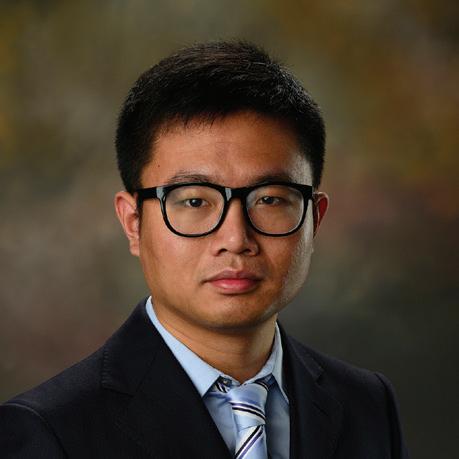

“The proposed research will establish a conceptually new material engineering methodology to establish distinctive material properties for a range of functionalities. It will fill the scientific gap of spatial
heterogeneity of isotopes,” Dai said. Though isotopes exist everywhere, they are always evenly distributed in space.
“I want to reposition isotopes and spatially engineer them for new material properties,” Dai said.
To do so, he will use state-of-the-art techniques to build van der Waals heterostructures comprised of various monoisotopic components in order to establish advances over current isotope-homogenous material systems.
Dai said the project’s prototype heterostructures can be modified to precisely manage nanoscale energy capacity, electromagnetic wave transmission and photonic density of states for utilization in biosensing, energy transfer, infrared light sources and quantum information and technologies.
30 SAMUEL GINN COLLEGE OF ENGINEERING
WIRELESS
ADVANCING FUNDAMENTAL UNDERSTANDINGS OF WIRELESS HIERARCHICAL FEDERATED LEARNING
BY JOE MCADORY
Xiaowen Gong
Assistant Professor
334.844.1851
xzg0017@auburn.edu
aub.ie/XGong
Xiaowen Gong, assistant professor in electrical and computer engineering, recently earned a five-year, $500,000 National Science Foundation (NSF) Early Faculty Career Development (CAREER) Award for his project, “Towards Efficient and Fast Hierarchical Federated Learning in Heterogeneous Wireless Edge Networks.”


“I’m so humbled to receive this honor,” said Gong, who specializes in wireless engineering. “There are so many other researchers who do excellent work but have not received this award. I view this award more as inspiration and encouragement for my future work.”
Gong’s project is expected to advance the fundamental understandings of, and develop adaptive and efficient algorithms and schemes for, computation and communication designs of wireless hierarchical federated learning — a machine learning approach that trains a machine learning system across multiple decentralized servers from distributed wireless devices with local data samples — while also addressing its challenges.
The NSF CAREER Award also focuses on the integration of research within education.
Gong proposes hands-on wireless and machine learning/AI projects for college students and outreach activities on robotics for K-12 students.
He was previously granted $589,889 by the NSF to provide hands-on research experiences in robotics and machine learning/AI to approximately 30 STEM middle-school teachers in underserved regions of Alabama during the next three years.
31 DEAN’S REPORT 2022-23
NEW OPPORTUNITIES ABOUND WITH ACADEMIC AND RESEARCH PARTNERSHIPS
AUBURN ENGINEERING, AIR UNIVERSITY REACH EDUCATIONAL PARTNERSHIP AGREEMENT

Auburn University Samuel Ginn College of Engineering professors will soon have access to new and exciting research opportunities.
The U.S. Air Force will soon have access to Auburn Engineering’s brainpower.
A recently-signed, five-year educational partnership agreement provides Auburn Engineering students and faculty an opportunity to collaborate scientifically with Air University at Maxwell Air Force Base in Montgomery — an arm of the U.S. Air Force — to expand and create knowledge, solve engineeringrelated problems and optimize existing modes of operation.
“The reputation of Auburn University and the Samuel Ginn College of Engineering transcends state and regional borders,” said Steve Taylor, interim dean of engineering. “Entities such as the U.S. Air Force recognize we produce some of the nation’s most
gifted engineers and world-class researchers, and our experience working with our nation’s defense sector makes this a perfect fit.”
According to the agreement, its objective is to develop an environment that promotes unique opportunities for students and faculty to participate in Air Force-related research, while enhancing educational and research opportunities in science, technology, engineering and mathematics (STEM), and other disciplines relevant to education, collaboration and innovation properties.
COLLABORATION AGREEMENT WITH KITECH TO EXPAND UPON FACULTY RESEARCH EFFORTS
Auburn University President Chris Roberts recently signed a memorandum of understanding (MOU) with Nak Kyu Lee, president of the Korea Institute of Technology (KITECH), that will expand upon the collaborative research efforts of Auburn’s faculty and laboratories with local companies supported by KITECH.
Building on the signed MOU between the organizations in 2015, this newly expanded agreement includes the establishment of research and/or automotive technology support offices and laboratories, the creation of joint research projects
and the exchange of technical information, periodic training symposia and consulting.
“As a land-grant university, Auburn aspires to deliver real-world, practical solutions,” said Roberts. “Through joint research efforts and projects, we can anticipate and meet the distinct needs of the automotive manufacturers and suppliers along the I-85 corridor that have strongly impacted our region’s economic climate. This partnership demonstrates an interchange of education, research and service, with global implications.,” he added.
32 SAMUEL GINN COLLEGE OF ENGINEERING
The agreement spelled out a number of desired outcomes:
• Establishment of research and/or automotive technology support offices and laboratories
• Exchange of scientific/technical research materials, publications, information and advice
• Development of mutually agreed upon collaborative research projects
• Identification of technical barriers encountered and improvement needed by manufacturers
• Provision of technical solutions using means and technologies available at both institutions
• Creation of joint research projects to identify funding opportunities through governmental agencies
• Organization of periodic symposia on manufacturing technologies and related subjects.
Enhanced collaboration in research, education and workforce development.
Those are the key tenets of a five-year memorandum of understanding (MOU) executed June 26 by Auburn University and Los Alamos National Laboratory (LANL), where Auburn and LANL personnel will:
• Work together to identify opportunities for collaboration on joint research proposals
• Enhance Auburn University’s curricula and educational opportunities by leveraging LANL expertise
• Improve LANL workforce-building, revitalization and retention through student recruitment, research collaborations, LANL staff interacting with Auburn faculty and students, LANL scientists offering seminars at Auburn, Auburn faculty offering seminars at LANL and exchange visits/ sabbaticals
• With a focus on cyber and critical infrastructure security, artificial intelligence and data analytics, the MOU will primarily involve the Auburn Cyber Research Center and the McCrary Institute for Cyber and Critical Infrastructure Security, along with other relevant faculty from the Samuel Ginn College of Engineering

“Auburn Engineering is committed to fostering partnerships that advance research, improve the student experience through direct engagements with industry professionals and develop industry relationships that enhance career opportunities for our graduates beyond Auburn,” Taylor said.
“This memorandum of understanding with Los Alamos National Laboratory does just that. I’m excited to watch this relationship develop into something extremely beneficial for the university, our faculty, students and Los Alamos,” he added.

33 DEAN’S REPORT 2022-23
Auburn University President Chris Roberts, left, and KITECH President Nak Kyu Lee sign the historic memorandum of understanding between the institutions.
Auburn’s MOU agreement with Los Alamos National Laboratory allows both institutions to identify opportunities for collaboration on joint research proposals.
AUBURN SIGNS MEMORANDUM OF UNDERSTANDING WITH LOS ALAMOS NATIONAL LABORATORY
FACULTY HIGHLIGHTS
Brendon Allen, assistant professor of mechanical engineering, received a $472,000 grant from the National Science Foundation for the project “Safe Lyapunov-Based Deep Neural Network Adaptive Control of a Rehabilitative Upper Extremity Hybrid Exoskeleton.” Chad Rose, assistant professor of mechanical engineering, and Jaimie Roper, associate professor of kinesiology, are collaborators on this project.
The Auburn University Transportation Research Institute (AUTRI) was awarded the Council of University Transportation Center‘s (CUTC) 2022 Technology Transfer Leadership Award at the CUTC Annual Awards Banquet in conjunction with the 102nd Annual Transportation Research Board Meeting. Led by Jeffrey LaMondia, professor of civil and environmental engineering, the team included graduate students Fernando Cordero and Corinne Arcenal, as well Sondra Parmer, Ruth Brock and Mitch Carter from the Alabama Cooperative Extension System.
Bryan Beckingham, associate professor of chemical engineering, was named director of the Center for Polymers and Advanced Composites at Auburn University.
David Bevly, the Bill and Lana McNair Distinguished Professor of mechanical engineering, received a $1.4 million contract from Radiance Technologies, Inc. This effort will study different positioning, navigation and timing methods for space and cyberspace.
Roy Hartfield, Walt and Virginia Woltosz Professor in aerospace engineering, was selected to receive the 2023 American Institute of Aeronautics and Astronautics (AIAA) Aerodynamics Award. This award is presented for meritorious achievement in the field of applied aerodynamics, recognizing notable contributions in the development, application, and evaluation of aerodynamic concepts and methods
and is sponsored by the AIAA Applied Aerodynamics Technical Committee.
Masatoshi Hirabayashi, associate professor in aerospace engineering, was part of a NASAsupported sciencific team assembled to detail results of the first Double Asteroid Redirection Test (DART). The spacecraft, launched from California in the fall of 2021, successfully collided with Dimorphos, moon of Didymos, on the afternoon of Sept. 26, 2022.
Brendan Higgins, associate professor of biosystems engineering, is the principal investigator on a $9.95 million grant to transform controlled environment agriculture (CEA). Auburn Engineering co-PIs include Sushil Adhikari, professor, Department of Biosystems Engineering; David Blersch, associate professor, Department of Biosystems Engineering; Hossein Jahromi, assistant research professor, Department of Biosystems Engineering; and Daniela Marghitu, Department of Computer Science & Software Engineering.
Joe Majdalani, the Hugh and Loeda Francis chair of excellence and professor of aerospace engineering, was awarded the Abe M. Zarem Educator Award, presented by the American Institute of Aeronautics and Astronautics, for the third time.
Shiwen Mao, director of the Wireless Engineering Research and Education Center at Auburn University, has been named editor-in-chief of the Institute of Electrical and Electronics Engineers (IEEE) Transactions on Cognitive Communications and Networking (TCCN), a top-tier publication of the IEEE focusing on spectrum and machine learning.
Alice Smith, the Joe W. Forehand/Accenture Professor of industrial and systems engineering, was named an INFORMS fellow for outstanding lifetime accomplishments.
34 SAMUEL GINN COLLEGE OF ENGINEERING
Daniel Tauritz, associate professor of computer science and software engineering, and interim director/chief cyber artificial intelligence strategist of the Auburn Cyber Research Center since 2020, has been appointed Auburn University’s director for national laboratory relationships.
Jin Wang, the Walt and Virginia Woltosz Professor of chemical engineering, was awarded Auburn’s highest honor for research in 2022 — the Creative Research and Scholarship Award.
Samuel
Matthew Yarnold, associate civil and environmental engineering professor and director of the Advanced Structural Engineering Laboratory, is the principal investigator on two new projects totaling $547,000 over the next two years. The first featuring Kadir Sener, assistant civil and environmental engineering professor as co-PI, is titled, “Drop-In Top Flange Connections for Increased Speed of Steel Erection,” is sponsored by the American Institute of Steel Construction. The second, with co-PIs Sener and associate civil and environmental engineering professor David Roueche, is titled “Girder-Slab Experimental Testing” and is sponsored by Girder-Slab Technologies.
35 DEAN’S REPORT 2022-23
The
Ginn College of Engineering embraces its land-grant values in order to transform lives and enhance society through impactful engineering education and research.
NEW FACULTY MEMBERS
Yadrianna Acosta-Sojo | University of Michigan Assistant Professor | Industrial and Systems Engineering


Dr. Acosta’s research focuses on utilizing wearable technologies (e.g., exoskeletons) and methods to understand changes in proprioception and motor control, and improve rehabilitation procedures for patients with neurological disorders. The knowledge from this research can support design decisions and the development of training and rehabilitation procedures to improve the quality of life of patients.
Dr. Arik has extensive experience in electronics technologies related to defense, medical, energy, aviation and photonics. He has more than 220 peer reviewed journal and conference papers and over 110 patents.

My applied research areas of interest are systems engineering, model based systems engineering and digital engineering processes, tools, practices and concepts for Department of Defense and commercial industries. I am working with Huntsville-based partners to create streamlined process models for model & simulation verification, validation & accreditation for complex systems of systems.
My research generally focuses on engineering applications of electromagnetics, including remote sensing, navigation and defense applications. I have a particular research interest in space weather and its impact on terrestrial systems, and propagation of radio waves in the ionosphere.

36 SAMUEL GINN COLLEGE OF ENGINEERING
Susan Askew | Troy University (MSM) Professor of Practice | Industrial and Systems Engineering
Hunter Burch | University of Florida Assistant Professor | Electrical and Computer Engineering
Mehmet Arik | University of Minnesota, Twin Cities Associate Professor | Mechanical Engineering
William Heaton | Cambridge University Ph.D. | Brown University M.D. Assistant Professor | Computer and Software Engineering

My research focuses on computational methods and data analysis to extract new biological insights from genomic and transcriptomic data. I build tools used by biologists to analyze their DNA and RNA sequencing data. I create methods especially for emerging and cutting edge sequencing technologies.
 Farah Kanda | North Dakota State University Associate Professor | Computer and Software Engineering
Farah Kanda | North Dakota State University Associate Professor | Computer and Software Engineering
My research focus is on behavioral modeling and analysis of Internet of Things (IoT) devices as they operate and are used to monitor critical systems and infrastructures. The research aims to provide dynamic and adaptable layers of security in support of system assurance and increase the level of confidence in using IoT in different setups and deployments. My areas of interest are cybersecurity, computer networks, IoT, distributed systems and blockchain.
Ali Khosravi | University of Colorado Assistant Professor | Civil and Environmental Engineering
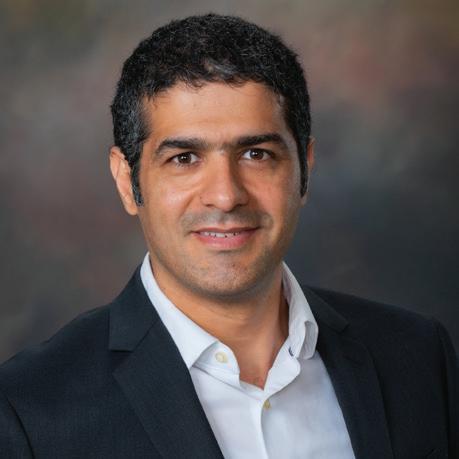
My Research focuses on studying the interactions between hydraulic, thermal and mechanical processes in unsaturated soils and rocks with the aim of improving our understanding of the principles and material properties that govern the performance of geotechnical structures such as landfill cover systems, pavements, embankments and dams, foundations, heat exchanger geotechnical systems and retaining walls. My research also explores the field of bioinspired geotechnics, where biological design concepts and procedures are applied to engineering challenges in geotechnical infrastructure systems.
Konstantin Klyukin | Saint Petersburg State University Assistant Professor | Mechanical Engineering
My research interests lie in connecting atomistic simulations and machinelearning methods to accelerate the design of materials for energy and information technologies. Our group employs various simulation techniques to predict material properties, understand atomic-scale processes and design novel materials with improved characteristics.

37 DEAN’S REPORT 2022-23 37
NEW FACULTY MEMBERS
Chanho Lee | University of Tennessee Assistant Professor | Mechanical Engineering

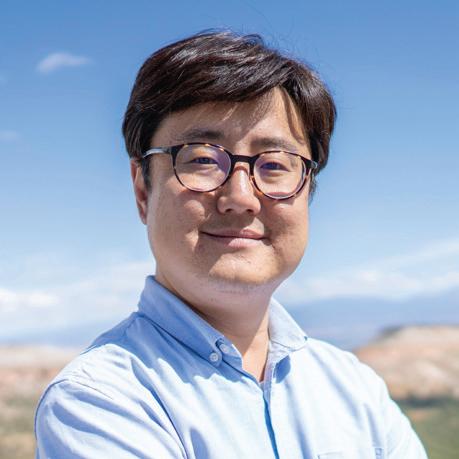
My research focuses on the design/development of new metallic materials, such as high-entropy alloys (HEAs) with superior mechanical properties at extreme environments. More especially, our research aims to (1) establish a fundamental understanding of alloy-design strategies that can significantly improve the mechanical properties; (2) investigate the deformation mechanisms, employing an integrated experimental and theoretical approach; and (3) understand the processing-microstructure-property-performance links underlying the mechanical behavior of new alloy systems.
Nan Li | University of Michigan Assistant Professor | Aerospace Engineering
My research focuses on the development and application of advanced decision and control algorithms for realizing safe and reliable autonomy in transportation and space exploration. I am particularly interested in investigating new algorithms enabled by data and cloud/distributed computing.
Samuel Mulder | Missouri S&T Associate Resident Professor | Computer Science and Software Engineering
My research interests are primarily in the area of binary program analysis, program understanding and immersive analytics.

38 SAMUEL GINN COLLEGE OF ENGINEERING
Cassandra Porter | Yale University Assistant Professor | Chemical Engineering

My research focuses on the development of new polymeric membranes, especially for aqueous separations. The research combines the development of new polymer chemistry, synthesis and analysis techniques with membrane testing and optimization of filtration processes. We are interested in improving water purification and wastewater treatment as well as recovering valuable species dissolved in water, such as lithium.
Akond Rahman | North Carolina State University Assistant Professor | Computer Science and Software Engineering

My research interests are in software engineering focused on DevOps and secure software development. I rely on a wide range of techniques, such as model checking, program analysis and statistical methods to pursue my research goals.
Matthew Yarnold | Drexel University Director | Advanced Structural Engineering Laboratory Civil and Environmental Engineering
My research interests focus on our nation’s infrastructure and the built environment. One of my main research areas is bridge engineering, and another is structural steel components and systems. Most of my studies involve experimental testing of structural systems (laboratory and field assessment).
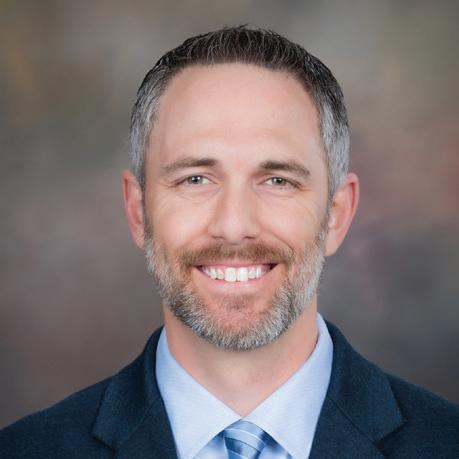
39 DEAN’S REPORT 2022-23 39
The best student-centered experience in America.
3,011 students supported by scholarships in 2022-23
$31.7 MILLION scholarship support awarded to engineering students in 2022-23
58 engineering student organizations

40 SAMUEL GINN COLLEGE OF ENGINEERING
STUDENT HIGHLIGHTS
Rudy Al Ahmar, a graduate student in aerospace engineering, received the 2022 Abe M. Zarem Award for Distinguished Achievement in Aeronautics. The award is presented by the American Institute of Aeronautics and Astronautics.
Sean Bowerfind, a graduate student in aerospace engineering, was named 2022 Undergraduate Student of the Year by the Greater Huntsville Section of the American Institute for Aeronautics and Astronautics.
Morgan Burk and Stanton Freeman, juniors in civil and environmental engineering, placed first in the international American Society of Civil Engineers (ASCE) Innovation Contest at the 2022 ASCE Convention.
Camille Coulter, a senior in biosystems engineering, took home the top prize at the annual Engineer Together design competition for her graphic that visually depicted what it means to “Engineer Together.”
Zoey Cunningham, a senior in electrical and computer engineering, was elected president of the National Pan-Hellenic Council, a body of nine historically Black Greek organizations known throughout the country, including both sororities and fraternities.
Jackson Curtis, a senior in civil and environmental engineering, received an annual scholarship from the Alabama Chapter of the American Public Works Association (APWA), which awards up to three scholarships per year to deserving students in Alabama striving to complete educational requirements for a career path in public works.
The National Science Foundation awarded an INTERN supplement to graduate chemical engineering student Antara Mazumder. The supplement will allow Mazumder to live and conduct research at Lawrence Berkeley National Laboratory in Berkeley, California.
Shiva Nageswaran, a fifth-year doctoral student in industrial and systems engineering, won the Three Minute Thesis competition for his advanced safe seatbelt design that allows passengers to easily release themselves in the event of a rollover accident.
Prashamsa Pandey, a fourth semester graduate student in computer science and software engineering, was selected to attend the prestigious Computing Research Association (CRA)-Widening Participating (WP) Graduate Cohort for Women in San Francisco.
Chemical engineering junior Kate Preston was named the new Miss Auburn. She will serve as Miss Auburn until the next elections are held in February 2024.
Keziban Saloglu, a doctoral candidate in aerospace engineering, was awarded the 2023 Breakwell Student Paper Award, a prestigious student prize in astrodynamics, awarded by the American Astrological Society.
Two students in aerospace engineering, doctoral candidate Cody Shelton and junior Megan Hayes, were two of 10 scholars nationwide chosen for the 2023 Summer Department of Defense Science, Mathematics, and Research for Transformation (DoD SMART) International Internship Cohort.
Four researchers in aerospace engineering, graduate students Lokesh Silwal, Daniel Stubbs, and Abbishek Gururaj, and postdoctoral fellow Vikas Bhargav coupled their scientific findings with creative visual skills to earn awards at the Australasian Fluid Mechanics Society conference.
Zakariya Veasy, a senior in computer science and software engineering, won the annual Halloween Business Idea Pitch Competition for his creatiom of OMNIS, a crowdsourced social media platform designed to allow individuals the opportunity to earn money through community and peer-to-peer shortterm micro-loans.
41 DEAN’S REPORT 2022-23
CO-OP EXPERIENCE PROVIDES HANDS-ON EDUCATION
Jared Jones has a passion for serving others. He’s bagged diapers for the Women’s Hope Medical Clinic, staffed multiple church fall festivals, stocked shelves at the Food Bank of East Alabama and helped student peer team members with Engineering Without Borders design a suspension bridge system to support an irrigation pipeline to help struggling villagers in Bolivia.
“I enjoy the satisfaction that comes from being willing to give a part of yourself to better someone else in some way,” he said.
You should see his job experience.
Not only has the third-generation Auburn electrical engineer modeled specialized antenna configurations with MATLAB to study directivity patterns at various test frequencies to create easy-to-reference tables for future simulators as a 2022 summer intern at Dynetics in Huntsville, Alabama, but he developed a proof-of-concept test device for sonar systems,
debugged software on damaged units and more, during his three-semester co-op (2019-2021) at Johnson Outdoors Marine Electronics in Eufaula, Alabama.
It’s no wonder the senior from Gurley, Alabama, was named Auburn Engineering’s 2022 Frank Vandegrift Co-op Student of the Year. Established in honor of the former director of Auburn University’s Cooperative Education (Co-op) program, the award is presented each year to an outstanding Auburn Engineering coop student.

Auburn Engineering Co-op is a planned, supervised program that alternates semesters of full-time college classroom instruction with three semesters of fulltime paid employment.
“I would definitely recommend Auburn’s co-op program,” said Jones. “On-the-job experience is what companies are looking for. It’s an excellent way to get your foot in the door.”
42 SAMUEL GINN COLLEGE OF ENGINEERING
A RISING STAR IN ADDITIVE MANUFACTURING
In the five years since it was established through a public-private partnership with NASA, the National Center for Additive Manufacturing Excellence (NCAME) has brought in tens of millions in grants from government organizations and private companies.
But in terms of the center’s growing acclaim, for the moment, all director Nima Shamsaei wants to talk about is the success of his students.
“As academics, often we are evaluated by the number of our papers or the total amount of our grants; however, our ultimate products are the graduates of our programs,” said Shamsaei, Philpott-WestPoint Stevens Distinguished Professor of mechanical engineering. “These graduates will contribute to the field for years to come. It is a great satisfaction to see our students successfully graduate, join industry and become leaders in the field.”
Which is exactly what Pooriya Nezhadfar is becoming. And quickly. In November 2022, Nezhadfar won the inaugural Early Career Award from the Fatigue and Fracture of Engineering Materials and Structures journal for his work on enhancing ductility and fatigue
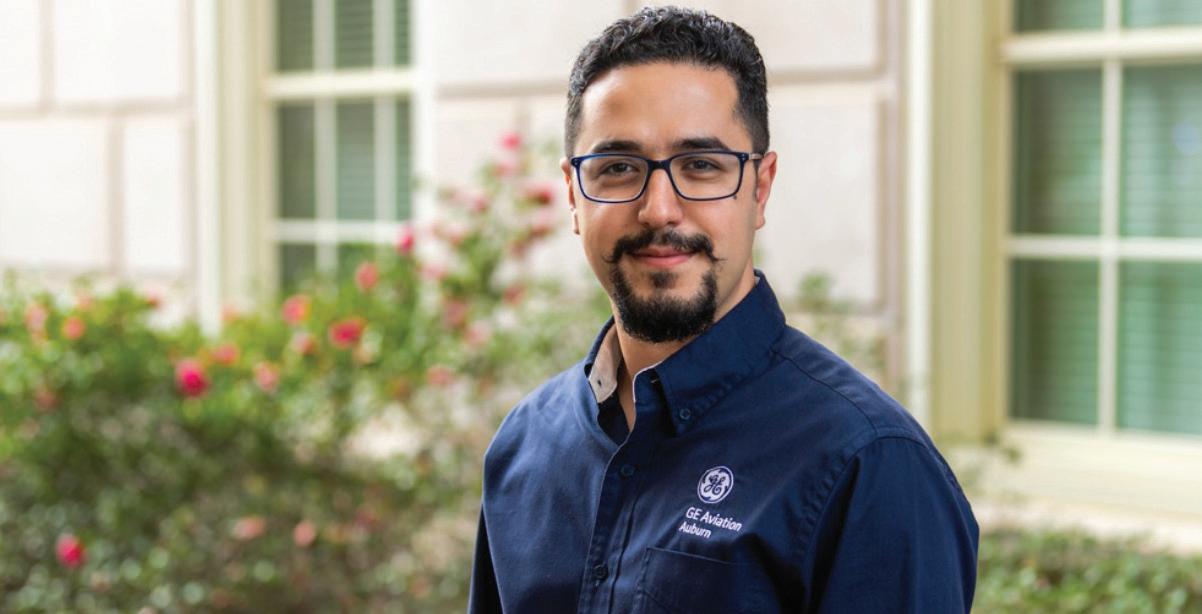
strength of AM metallic materials by preheating build platforms.
His most recent award is SAE International’s Henry O. Fuchs Student Award, which for the past 20 years has recognized extraordinary student accomplishment in fatigue research and applications.
“It’s very exciting and also very humbling to have your work recognized and valued as something that could be truly interesting and applicable to your field,” Nezhadfar said. “I’m delighted to see the hard work I put in at Auburn, and at NCAME under Dr. Shamsaei’s direction, pay off and open doors.”
In 2022, G.E. Aerospace, located in Auburn just down the road from Auburn University, hired Nezhadfar as its lead additive manufacturing specialist to help, as Nezhadfar put it, “turn dust to thrust.”
“There is, of course, a lot of research with advanced manufacturing, but G.E. Aerospace is a pioneer in fabricating parts with additive manufacturing that are actually being used in jet engines. That’s the ultimate goal, and I’m looking forward to helping them achieve it,” he said.
43 DEAN’S REPORT 2022-23
ENSURING ENGINEERING’S FUTURE
The Samuel Ginn College of Engineering is committed to providing the best student-centered engineering experience in America. Our Keystone Society donors are a strategic part of this vision, providing much-needed annual funds to the college. These funds enhance engineering education and allow the college to remain nimble and tackle any unexpected challenges.
STRATEGIC LEADERSHIP TEAM
The Strategic Leadership Team exists to help move the Samuel Ginn College of Engineering’s highestlevel strategic priorities forward. Since it was established, the team has contributed more than $189 million to propel these priorities.
51.3% 48.7% of all funds raised were spendable of all funds raised were endowed Parents FriendsCorporations Faculty/Staff Alumni Other
LARGEST AREAS OF SUPPORT
Scholarships:
The Samuel Ginn College of Engineering provided more than $4.7 million in engineering scholarships in the academic year 2022-23 supporting a total of 1,774 students.
35.3% of funds received went to scholarships – a total of $14.2 million raised toward the total endowment.
Programmatic:
The college raised $22 million for programmatic support. These funds are mostly unrestricted Funds for Excellence, which allow the deans and department chairs to meet priority goals for the college.
WHO ARE AUBURN ENGINEERING’S DONORS?
3,378 DONORS have given
7,565 GIFTS in fiscal year 2022
$43.4 MILLION funds raised in fiscal year 2022
44 SAMUEL GINN COLLEGE OF ENGINEERING
STUDENT SUPPORT FROM PRE-COLLEGE TO GRADUATION AND BEYOND
THE AUBURN ENGINEERING PIPELINE
What started with a promotional coloring book and has evolved into a full-fledged Future Engineer Club, aimed at engaging children as young as kindergarten, is just the beginning of the Auburn Engineering recruiting pipeline. Through the Office of Recruitment, K-12 Outreach and Scholarships, pre-college students are introduced to Auburn Engineering in increasingly unique and appealing ways. Each outreach event or mailing is designed to pique their interest in engineering as a discipline, help them define their potential future areas of study and eventually welcome them to campus as freshman or transfer engineering students.
RECRUITING, RETAINING AND REWARDING WOMEN IN ENGINEERING
Fostering the success of female engineering students is the guiding principle of 100+ Women Strong, an organization to recruit, retain and reward Auburn women in engineering. Alumni and friends of Auburn Engineering offer their time to encourage female engineering students through mentoring, sharing professional experiences and unique networking opportunities. With more than 260 alumni involved in the organization, 100+ Women Strong takes the notion of “If I can see you, I can be you” and makes it a reality for women engineering students.
NEW NAME, SAME FOCUS ON ENGINEERING EXCELLENCE
The Center for Inclusive Engineering Excellence plays a vital role in promoting diversity among the Auburn Engineering student body. With the goal to strengthen the recruitment and retention of underrepresented students in the Samuel Ginn College of Engineering, the center offers academic and professional development workshops, collaborative study groups and one-on-one peer learning to prepare students to confidently take the next steps on their engineering career path.
AWARD-WINNING ADVISING AND MENTORING
The Engineering Office of Student Services is engaged and ready to help students achieve their academic goals. Through “Engineered for Success,” the office’s award-winning advising program, helping all students succeed academically is at the forefront. Additional peer advising and mentoring programs serve to further highlight the Auburn Engineering experience as one that centers student academic achievement.
IMPACTFUL PEER LEARNING CENTER
Students are encouraged to participate in individual and group tutoring services that cover nearly 75 subjects in math, science and high-demand engineering courses.
PREPARING STUDENTS FOR SUCCESS AFTER AUBURN
The college’s Office of Career Development and Corporate Relations aims to equip students to discover, develop and launch purposeful careers. By providing customized, student-centered career development coaching and resources and cultivating industry-focused partnerships, Auburn engineers can feel confident in their search for a co-op, internship or full-time position.
86% of students experienced positive career outcomes within six months of graduation
92% positive outcome rate for students who completed an internship and/or co-op Latest
45 DEAN’S REPORT 2022-23
data available is from 2021-22 academic year.
RESEARCH CENTERS
Auburn University expanded its footprint with new facilities in Huntsville to the north and a planned expansion in Orange Beach in the south in 2022.
The Research and Innovation Campus in Huntsville is designed to foster a new era of interagency and interdisciplinary collaboration necessary to secure the nation into the next century. It will serve as a state-of-the-art, multi-million-dollar collaboration engine, conference center and research space that extends Auburn’s expertise and next-generation resources to the defense, space and law enforcement agencies.
“The Auburn University Research and Innovation Campus will be where today meets tomorrow,” said Auburn University President Chris Roberts. “The facility will fast-track career connections that change the world, not only through the opportunity for next-generation cross-domain collaboration among agencies, but by supplying our partners access to Auburn’s most-promising young minds.”
Experimentation with co-located laboratories will allow Auburn research professionals and students to conduct cutting-edge research and development across a range of technology readiness levels to help customers overcome national security, aerospace and biotechnology challenges. These laboratories will facilitate expansion in Huntsville
of high-profile Auburn research programs such as advanced manufacturing, additive manufacturing, biotechnology, quantum metrology, cyber and critical infrastructure security, and assured position, navigation and timing. To elevate Auburn’s ability to conduct space research, facilities are available for use as an operations center for NASA, DOD and private sector missions.
Housed within Auburn’s Research and Innovation Campus will be the Applied Research Institute. The institute will represent an aggregation and culmination of various defense, aerospace, national security and biotech efforts at Auburn University. The proposed institute will serve as a hub to coordinate, organize and market these many efforts to Auburn’s external constituents.
“This institute will provide a more streamlined structure for Auburn operations in Huntsville and it will become the main point of entry for the Huntsville community to engage with Auburn University for applied research and development,” Roberts said.

In the south, the university has approved a project to build a Gulf Coast Engineering Research Station in Orange Beach.
The building, which is being constructed on land provided by the City of Orange Beach on Terry
46 SAMUEL GINN COLLEGE OF ENGINEERING
AUBURN’S EXPANDING STATE FOOTPRINT
Cove off Perdido Bay with direct access to the Gulf of Mexico, will consist of laboratory, office and collaborative meeting spaces.
The project will provide dedicated space for research of coastal environments and communities of the Gulf Coast, while also providing collaborative opportunities with other Marine Environmental Sciences Consortium institutions.
“We are thrilled to announce this new endeavor to further Auburn University’s mission as one of the nation’s premier land-grant universities, and we are
extremely appreciative of the support of the Board of Trustees and the president’s office,” said Steve Taylor, interim dean of Auburn’s Samuel Ginn College of Engineering. “This facility will expand collaborative opportunities with our friends and partners with the City of Orange Beach, the University of South Alabama and other regional institutions and industries as we work together to study, develop and implement infrastructure resiliency, environmental protection, restoration, sustainability and conservation actions that will continue to improve the quality of life and enhance economic advancement in this vital area to our state.”
10 MILLION MILES OF INNOVATION
The National Center for Asphalt Technology (NCAT)’s Test Track recently crossed 10 million miles driven.
Opened in 2000 as a testing facility for asphalt research, the track has provided pavement engineers across the USA with an outdoor laboratory where they can experiment with pavement designs while avoiding risks associated with damaged pavements on real-world roadways.
“The Test Track has always been an indispensable research tool to help highway agencies and the asphalt industry answer questions and prove the viability of technologies,” said NCAT Director Randy West.
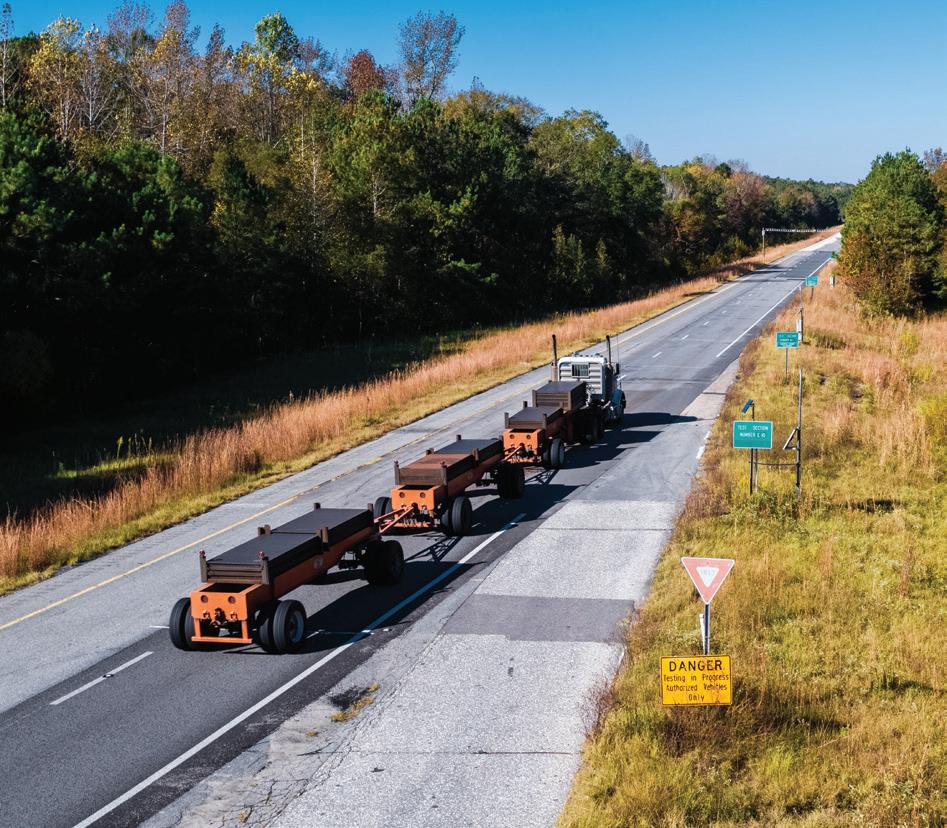
The Test Track offers researchers a unique chance to design, implement and show their findings on asphalt technology in one location, and has saved state departments millions of dollars each year with its results.
Research at the Test Track unites real-world pavement construction with live heavy trafficking in a controlled environment.
This allows highway agencies and commercial interest groups to quickly analyze and implement findings from the track.
“Our mission is safe and sustainable asphalt pavements at the lowest possible life-cycle cost,” said NCAT Associate Director and Research Professor Buzz Powell. “We’re the only place that has a track like this. We’re the only place that has this outdoor laboratory where we can connect lab predictions to real-world performance.”
47 DEAN’S REPORT 2022-23
@AuburnEngineering @auburnengineers @AuburnEngineers @AuburnEngineers linkedin.com/school/auburnengineering eng.auburn.edu/flickr Non-profit Org. U.S. Postage PAID Permit No. 9 Auburn, AL 1301 Shelby Center / 1161 W. Samford Ave., Building 8
AL
ENG.AUBURN.EDU
Auburn,
36849-0001

































 BY JOE MCADORY
BY JOE MCADORY































 Farah Kanda | North Dakota State University Associate Professor | Computer and Software Engineering
Farah Kanda | North Dakota State University Associate Professor | Computer and Software Engineering












